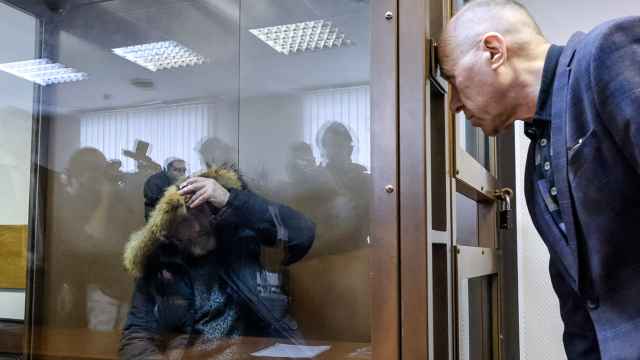The annual Gaidar Forum, held last week in Moscow, is a good occasion to assess the country's economic state of affairs. As usual, economist Vladimir Mau mobilized hundreds of prominent speakers for the forum, who offered a clear message: Russia's economy and politics are marked by what optimists call stability and what pessimists call stagnation.
But public discussion about the country's economic health has become less free. Highly qualified liberal economists still hold top government posts, but they have limited power and are more careful with their statements. The two most influential ideas were that the Russian economy is caught in a "middle-income trap" and it suffers from "stagflation."
Prime Minister Dmitry Medvedev claimed that Russia's economic growth sources have been exhausted, and he introduced the idea of Russia being in a "middle-income trap," drawing on an academic paper by the Berkeley Professor Barry Eichengreen. Medvedev was concerned with the sudden slowdown in economic growth, which is common to countries that have reached middle incomes, such as Russia and Brazil.
Sensibly, Medvedev emphasized that the causes were primarily domestic in nature. Russia risks losing out when competing with more advanced economies because of insufficient institutions and high costs in less developed economies. It needs to improve the quality of its labor, management, health care, pension system and, most of all, its institutions. Yet as usual, Medvedev ended with only minor proposals for improvement, notably in the business environment.
First Deputy Chair of the Central Bank of Russia Ksenia Yudayeva claimed that Russia, like India and Brazil, had entered "stagflation," as the West did in the 1970s. Their economic growth was declining, while inflation was rising. The super-commodity cycle was turning downward, which had a negative impact on many commodity producers. In this situation, monetary stimulus would be meaningless because it would not improve productivity, which was the key to progress. Meanwhile, inflationary expectations in Russia were high, and the task of the Central Bank was to reduce inflation to 4.5 percent in 2015 and 4 percent in 2016.
The obvious conclusion was most clearly expressed by Mau in his final keynote speech. It is time to move from a demand economy to a supply economy. He drew the parallels with the end of stagflation around 1980, when U.S. President Ronald Reagan and British Prime Minister Margaret Thatcher had called for an end to demand management and instead focused on supply. Indeed, Russia needs more "creative destruction," meaning both more bankruptcies and more startups.
Economic Development Minister Alexei Ulyukayev opened the forum with a daring programmatic speech. Russia now seemed stuck at an annual growth rate of no more than 2.5 percent, while the rest of the world was set to grow at 3.5 percent. He focused on two factors to boost growth. Russia's investment of 21 percent of gross domestic product needed to increase to the savings rate of 30 percent of GDP. The other factor was to promote supply by improving Russia's institutions in several ways.
Ulyukayev attacked the real problems, even if he did so in a delicate manner. Alluding to the U.S. debate about banks that "are too big to fail," he noted that "an economy cannot be based on national champions," criticizing Russia's state corporations. Last year, Ulyukayev froze their tariffs, and this year he wants to limit their rise to no more than 4.5 percent — that is, less than the inflation expected.
In this dispute lies a key reason for Russia's sharply falling growth rate in 2013. According to ordinary price theory, it makes sense to control prices of monopolies. But the managers of the country's large state corporations have been furious with Ulyukayev. They have done nothing to reduce their great inefficiency. Instead they have cut their investments, which has led to the stagnation of national investment because many obstacles hinder private investment. Given that the government cannot boost consumption as much in 2014, stagnation or falling economic activity appear likely in 2014.
A more long-term concern is the reversal of the pension reform of 2002. When the Gaidar Forum started, Vedomosti reported that the chief author of pension reform, Mikhail Dmitriyev, had been sacked as president of the think tank, the Center for Strategic Research, because he had opposed the destruction of the private pension funds. A natural consequence of this government decision will be less private savings and investment. Also, the development of the financial market will be impeded.
Corruption was discussed in multiple panels, but only as a low-level problem of doing business rather than as top-level larceny. The obvious solution is to discipline big state corporations, privatize them and liberalize their markets. But everyone realizes that this is not possible under the current regime, which favors economically harmful state corporations.
Russian politics are also characterized by stability or stagnation. Opposition politician Leonid Gozman had collected a panel of 10 largely liberal political pundits, including me. This group presented a surprising degree of consensus, which can be summarized as a suboptimal equilibrium. The panel expected neither liberalization nor much tighter authoritarianism.
According to the panel, the most important political events for Russia in 2013 were the Ukrainian protests, the amnesty of former Yukos CEO Mikhail Khodorkovsky and economic stagnation. The main challenges for 2014 are gradual institutional degradation and the stagnating economy. Yet only a severe external shock can shake up Russian politics in the short term. This could be Ukrainian politics or falling oil prices.
Alexei Levinson of the Levada Center, an independent polling agency, argued that the Putin regime had found a modus vivendi with society. Equally many regarded the situation as stabilization as stagnation. People did not like the regime, but they wanted their children to find good jobs in the government for their success. This was a bad time for democratic ideas, and democrats felt lonely.
Journalist Andrei Kolesnikov of Novaya Gazeta noted that the regime increases its emphasis on ideology because the state functions so poorly. Current state ideology is similar to that of former Italian authoritarian Benito Mussolini, drawing on old ideas of both tsarism and Soviet communism. It is defensive, but it reflects the views of both the elite and the population at large and contributes to stability in the short-term.
At the last session, Abel Aganbegyan, a prominent economist, summed up the situation by saying, "More factors draw down the economy than stimulate it." Indeed, the only significant positive government effort is to improve the business climate, but that will help little if nothing is done about top-level corruption or predatory state corporations.
Anders Åslund is a senior fellow at the Peterson Institute for International Economics.
A Message from The Moscow Times:
Dear readers,
We are facing unprecedented challenges. Russia's Prosecutor General's Office has designated The Moscow Times as an "undesirable" organization, criminalizing our work and putting our staff at risk of prosecution. This follows our earlier unjust labeling as a "foreign agent."
These actions are direct attempts to silence independent journalism in Russia. The authorities claim our work "discredits the decisions of the Russian leadership." We see things differently: we strive to provide accurate, unbiased reporting on Russia.
We, the journalists of The Moscow Times, refuse to be silenced. But to continue our work, we need your help.
Your support, no matter how small, makes a world of difference. If you can, please support us monthly starting from just $2. It's quick to set up, and every contribution makes a significant impact.
By supporting The Moscow Times, you're defending open, independent journalism in the face of repression. Thank you for standing with us.
Remind me later.





